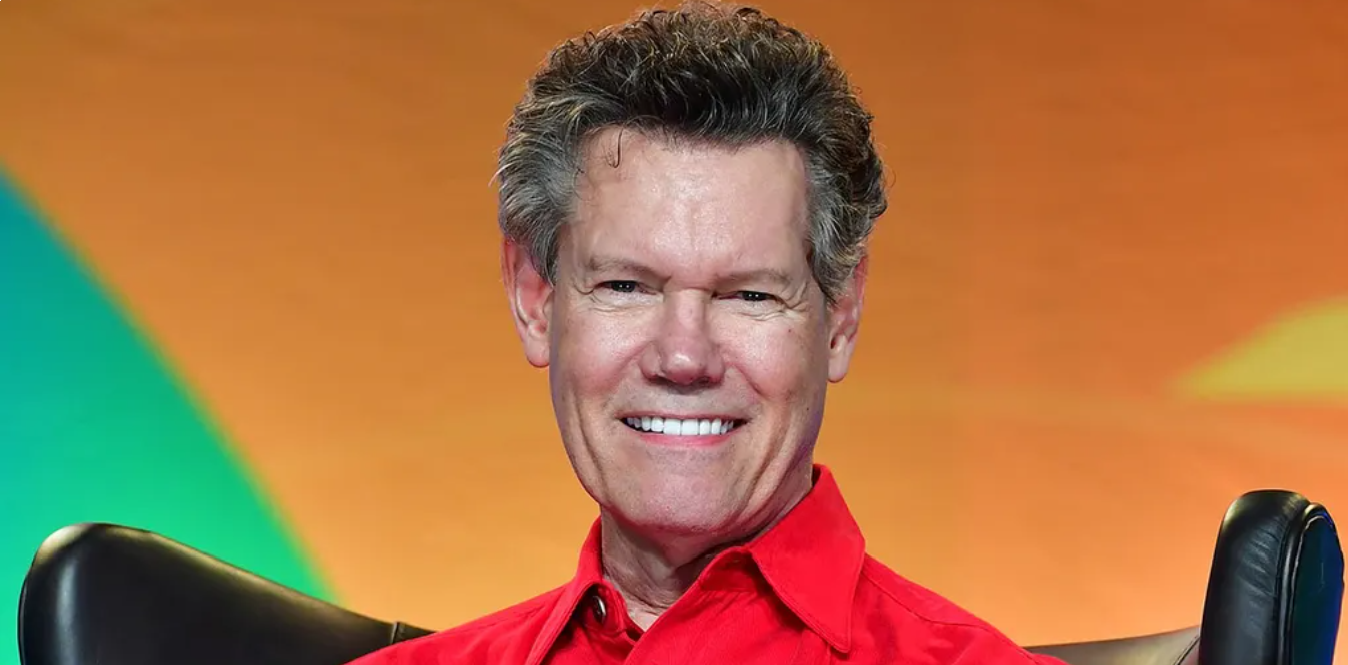Let’s talk about Randy Travis—not just the legendary country music star, but the man who’s faced some of life’s toughest battles and come out stronger. Over the years, Randy Travis’s mental health journey has captured the attention of millions. As someone who’s been there, done that, and still fighting the good fight, his story is a powerful reminder of the importance of mental health awareness. Whether you’re a fan or someone navigating your own struggles, Randy’s journey offers hope, inspiration, and a whole lot of heart.
Back in the late '80s, Randy Travis was the king of country music. His voice was gold, and his songs were the soundtrack to countless lives. But behind the glitz and glamour of the stage, Randy faced personal challenges that would test his strength and resilience. From health issues to mental health battles, Randy’s story isn’t just about surviving—it’s about thriving. In this article, we’ll dive deep into his journey, exploring the highs, the lows, and everything in between. Let’s take a closer look at how Randy’s experiences can teach us all something about mental health and the power of perseverance.
Through Randy Travis’s story, we’ll explore the importance of mental well-being, the role of support systems, and practical steps for recovery. Whether you’re dealing with your own struggles or want to help someone else, this article will give you the tools and inspiration to make a difference. So grab a cup of coffee, and let’s get into it.
Read also:Is Lester Holt Ill The Real Story Behind The Rumors
Table of Contents
- Biography of Randy Travis
- Mental Health Struggles
- Recovery Journey
- Building a Support System
- Impact on Career
- Promoting Mental Health Awareness
- Long-Term Care and Management
- The Role of Family in Recovery
- Inspiration for Others
- Conclusion
Biography of Randy Travis
Randy Travis: The Early Years
Randy Travis, born Randy Bruce Traywick on May 4, 1959, in Marshville, North Carolina, didn’t start out as the superstar we know today. Growing up in a modest family, Randy discovered his love for music at a young age. That passion would eventually take him from the small town of Marshville to the bright lights of Nashville. Here’s a quick look at his personal and professional journey:
| Full Name | Randy Bruce Traywick |
|---|---|
| Date of Birth | May 4, 1959 |
| Place of Birth | Marshville, North Carolina |
| Profession | Singer, Songwriter, Actor |
| Genre | Country Music |
Randy’s career skyrocketed in the late '80s when he signed with Warner Bros. Records. His debut album, "Storms of Life," wasn’t just a hit—it was a phenomenon. It launched Randy into the spotlight, earning him countless awards and cementing his place as one of country music’s all-time greats. But as we’ll see, the road to success wasn’t without its bumps.
Mental Health Struggles
Randy Travis Mental Health Challenges
Life in the spotlight isn’t always as glamorous as it seems. For Randy Travis, the pressures of fame and personal challenges took a toll on his mental and physical health. In 2013, a stroke changed everything. Not only did it leave him partially paralyzed and impact his ability to speak and perform, but it also brought to light the importance of addressing mental health head-on.
- Stroke Recovery: The 2013 stroke was a turning point for Randy. It wasn’t just about regaining physical strength—it was about rebuilding his life.
- Substance Abuse: Like so many others, Randy battled alcoholism, which only added to his mental health struggles. It’s a reminder that even the strongest among us can face these kinds of challenges.
- Emotional Turmoil: The stress of maintaining a high-profile career, combined with personal issues, weighed heavily on Randy. It’s a balancing act that many of us can relate to, even if we’re not in the public eye.
Understanding Randy’s mental health struggles gives us a clearer picture of the challenges he faced—and how he overcame them. It’s not just about the obstacles; it’s about the strength it takes to face them.
Recovery Journey
Randy Travis’s recovery journey is nothing short of remarkable. After his stroke, he embarked on a path of rehabilitation that required every ounce of his determination. Physical therapy became a daily routine, helping him regain mobility and rebuild his strength. But it wasn’t just about the body—it was about the mind, too. Therapy sessions allowed Randy to process the emotional and psychological challenges he faced. And let’s not forget the unwavering support from his family and friends, who were there every step of the way.
- Physical Therapy: This was a crucial part of Randy’s recovery. It wasn’t easy, but it was essential for regaining his independence.
- Mental Health Counseling: Therapy wasn’t just a checkbox—it was a lifeline. It gave Randy the tools to navigate the emotional ups and downs of recovery.
- Support from Loved Ones: Family and friends played a vital role in Randy’s journey. Their encouragement and love made all the difference.
Randy’s commitment to his recovery is a shining example of what it means to never give up. His story is proof that with the right mindset and support, anything is possible.
Read also:Billie Eilish The Rise Of A Generations Voice
Building a Support System
The Importance of a Support System
When it comes to overcoming mental health challenges, having a strong support system is non-negotiable. Randy Travis’s journey highlights just how critical it is to surround yourself with the right people. Whether it’s family, friends, or professionals, a support system can make all the difference in the world.
- Family and Friends: They’re the ones who’ll be there through thick and thin, offering emotional support and encouragement when you need it most.
- Healthcare Professionals: These experts can provide the guidance and treatment options necessary for recovery. From therapists to doctors, their role is invaluable.
- Support Groups: Connecting with others who’ve faced similar challenges can be incredibly powerful. It’s a reminder that you’re not alone, and there’s strength in numbers.
A well-rounded support system doesn’t just help with recovery—it helps with life. It creates a network of people who care, understand, and are willing to help you every step of the way.
Impact on Career
Randy Travis’s mental health challenges had a profound impact on his career. After his stroke, he took a step back from the music industry to focus on recovery. But that didn’t mean his passion for music disappeared. In fact, it only grew stronger. Randy’s determination to return to the stage and share his music with the world was nothing short of inspiring.
Even with the setbacks, Randy continued to inspire fans with his music and his story. His resilience and courage earned him a new level of respect and admiration in the music industry. It’s a testament to the fact that even when life throws you a curveball, you can still hit it out of the park.
Promoting Mental Health Awareness
Raising Awareness Through Randy Travis’s Story
Randy Travis’s experiences have made him more than just a musician—they’ve made him a voice for mental health awareness. By sharing his story, Randy has helped break down the stigma surrounding mental health and encouraged others to seek help when they need it. His journey is a powerful reminder that mental health is just as important as physical health.
- Breaking Stigmas: Randy’s openness about his struggles has paved the way for more honest conversations about mental health. It’s about making it okay to talk about the hard stuff.
- Seeking Help: Whether it’s therapy, medication, or support groups, seeking help is a sign of strength, not weakness. Randy’s story proves that asking for help is one of the bravest things you can do.
- Community Support: Building stronger communities means creating environments where mental health is prioritized. It’s about coming together to support one another.
Raising awareness about mental health isn’t just about talking—it’s about action. It’s about creating a world where everyone feels seen, heard, and supported.
Long-Term Care and Management
When it comes to mental health, long-term care is key. For someone like Randy Travis, ongoing support and treatment are essential for sustained recovery. It’s not just about getting better—it’s about staying better. Here are some strategies for maintaining mental health over the long haul:
- Regular Check-Ins: Staying in touch with healthcare providers ensures that any issues are caught early and addressed quickly.
- Healthy Lifestyle Choices: A balanced diet, regular exercise, and adequate rest can make a world of difference in how we feel and function.
- Continued Counseling: Therapy isn’t a one-and-done deal—it’s an ongoing process that evolves with your needs.
By implementing these strategies, individuals can maintain their mental health and enjoy a better quality of life. It’s about taking care of yourself for the long run.
The Role of Family in Recovery
Family Support in Mental Health Recovery
The role of family in mental health recovery can’t be overstated. For Randy Travis, the support of his loved ones was a game-changer. Families have the power to create an environment of love, understanding, and encouragement that’s crucial for healing.
- Providing Emotional Support: Sometimes, the best thing you can do is listen. Being there for someone during tough times can make all the difference.
- Assisting with Daily Tasks: Whether it’s helping with chores or just being present, practical support can alleviate stress and make recovery easier.
- Advocating for Care: Ensuring access to the right healthcare services and treatments is vital. Families can be the voice someone needs when they’re struggling to find theirs.
Family involvement in recovery is about more than just helping—it’s about creating a space where healing can happen. It’s about showing someone that they’re not alone and that they’re loved, no matter what.
Inspiration for Others
Randy Travis’s journey is a powerful reminder that resilience, determination, and hope can carry you through even the toughest times. His story is a beacon of light for anyone facing their own mental health challenges. Here are a few key takeaways from Randy’s experience:
- Perseverance: Life throws curveballs, but Randy’s story shows us that we can hit them back with grit and determination.
- Hope: Even when things seem impossible, there’s always a reason to keep going. Randy’s journey is proof that recovery is possible.
- Community: Building and leaning on a supportive network of friends, family, and professionals can make all the difference.
Randy Travis’s story is a testament to the strength of the human spirit. It’s a reminder that with the right mindset, support, and tools, we can overcome anything.
Conclusion
Randy Travis’s mental health journey is a powerful narrative of resilience, recovery, and hope. By diving into his challenges and triumphs, we gain a deeper understanding of the importance of mental health awareness and support. His story isn’t just about surviving—it’s about thriving. It encourages open conversations about mental health and inspires others to seek help when they need it.
We’d love to


